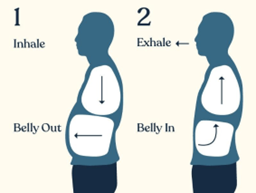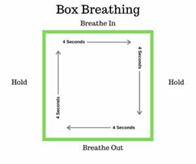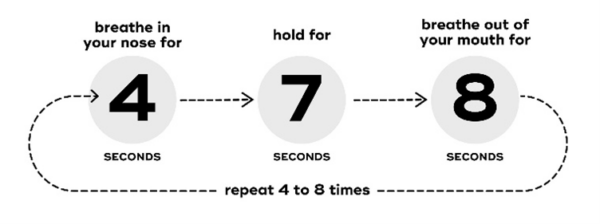Sometimes stressful situations arise faster than we can blink. Taking a break for a long walk or chatting on the phone with a friend might be good stress relievers, but some days our schedule is too busy for an extended pause. If you’re starting to feel overwhelmed but only have a few minutes, try a quick stress buster to help manage unexpected stress.
Take a Deep Breath
Deep breaths help slow our heart rate and bring more focus and clarity to our thoughts. There are many types of deep breathing exercises to try. Pick one to try and notice how it helps keep anxious thoughts at bay and allows you to be more present.
Belly Breathing. This form of breathing is also known as diaphragmatic breathing. It focuses on using your diaphragm to take a full and deep breath. Start by sitting up straight or lying down comfortably on your back. Place one hand on your chest and one hand on your belly. As you inhale, the hand on your chest should not move, but you should feel the hand on your abdomen rise. Then slowly exhale and feel the hand on your belly move inward as the hand on your chest stays still. Repeat several cycles.
Box Breathing. For this style of deep breathing, it can be helpful to draw a square on a piece of paper or visualize one with your eyes closed. As you trace each side of the shape and count to four, you will inhale, hold your breath, exhale, and hold your breath again in respective order. Repeat this cycle several times.
4-7-8 Breathing. Start by slowly inhaling and counting to four. Then, hold your breath and count to seven. Finally, exhale slowly through pursed lips while counting to eight. Repeat this pattern several times.
Time for a Stretch Break
Stress can cause our muscles to contract and become tense. While this is helpful in an emergency, it can be frustrating when the tension continues and turns into soreness, pain, or headache. Take a quick five-minute stretch break to help relax your muscles, breathe, and manage stress better. Hold each stretch for 30-60 seconds, but do not hold your breath.
Use Your Senses
The 5-4-3-2-1 grounding technique is an exercise that uses your senses to bring your thoughts into the present moment. Start by finding five things you can see around you. Next, find four things you can touch near you. Then, acknowledge three things you can hear and two things you can smell. Finally, name one thing you can taste. This exercise helps you focus on your current environment and surroundings rather than dwelling on past or future worries.
Try Progressive Muscle Relaxation
This technique involves intentionally contracting a muscle for several seconds and then relaxing it. Start with muscles in your face, shoulders, and upper body, and progress down to your toes. Progressive muscle relaxation helps you acknowledge tense muscles and purposefully relax them one at a time. It encourages pausing your racing thoughts and instead listening to your body for a few moments. If you’re a beginner at this technique, try a guided meditation video on progressive muscle relaxation.
Count Your Blessings
Lastly, it’s helpful to count our blessings amid stressful times. Anytime we pause our negative or stressed thoughts to intentionally think about being grateful, we change our attitude and perspective quickly. Think of five things you are thankful for and write them down. Read that list throughout the day and add to it whenever you think of more blessings. When we change our perspective, we see more opportunities rather than hyper-focusing on stressful obstacles.
Continue Reading September 2023 Newsletter: Get Pumped about Blood Pressure




